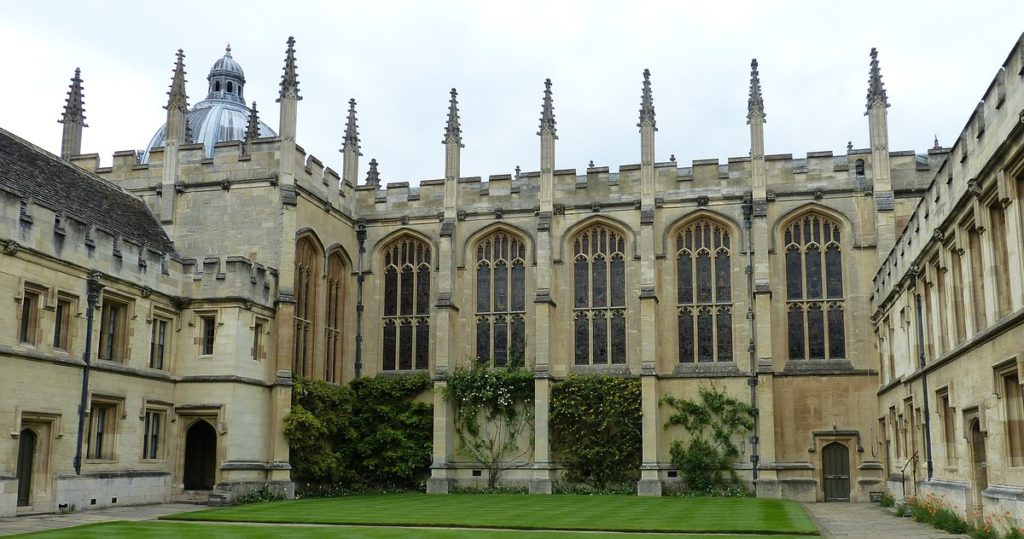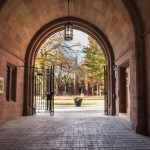In his recent book, Ethics in the Conflicts of Modernity, Alasdair MacIntyre writes that “so many of us lead potentially incoherent lives, lives that remain as coherent as they are only because and so long as certain questions go unasked, certain issues ignored or avoided or suppressed.” The modern university is one institution in which this unasking is especially entrenched. To understand this pervasive neglect of questions, we must appreciate that the modern university is in fact comprised of three distinct “universities,” each vying for the loyalty of students and insisting on a questionable epistemology. Call these the University of Rationalism, the University of Revolution, and the University of Subjectivism. In response, we must develop—or rather recover—a fourth university, the University of Listening.
The University of Rationalism
In the University of Rationalism, Truth is pursued through repeatable experiments and tests. The University of Rationalism discovers facts by experimenting on the causal relations between objects; it aspires to complete certainty and accuracy. It decries anyone who misreports the facts, not because dishonesty is unbecoming, but because a misreport damages the architecture of facts slowly being built toward Truth. If we are to know the cause of cancer, we must record experiments accurately, and repeat others’ work with consistency in order to verify them. After verification, we move on to the next study, and so on, and then we will know every fact, from beginning to end.
The University of Rationalism is not limited to the sciences; it does, however, require that all inquiry be scientific. The non-sciences should be modeled on the sciences: social sciences, business science, sports science, musicology. In economics, the University of Rationalism models the causal relations between factors, according to assumptions of human rationality. In light of empirical testing, these models may be revised to better approximate Truth. Philosophy is pure reason, though limited as a method because it cannot be tested. Its use comes only in showing others where their logic has been inconsistently applied, at times a useful role in building the architecture of facts.
Start your day with Public Discourse
Sign up and get our daily essays sent straight to your inbox.The University of Rationalism values those who disagree if they help establish the scientific impartiality which must mediate every person and his subject matter. Sometimes setting out different views will be to everyone’s benefit. All parties must agree, however, that Truth is out there and can be established through facts. Those who disagree with the method of testing, repeatability, and analytical logic are excluded from the University of Rationalism. Time and technological progress will show its detractors on the outside that the state was right to fund the University of Rationalism.
The University of Rationalism starts with what we know, not what opinions we have, and asks everyone to leave their bias at the door. The University of Rationalism is a place for individuals who approach their topic with impartiality and so reveal the Truth.
The University of Revolution
The second university is the University of Revolution. Its students, acknowledging the existence of power structures, seek out the counter-Truth by appeal to which the status quo can be shattered and the elites challenged. If anyone claims ownership of counter-Truth, it is no longer True, for counter-Truth involves a constant breaking of the coercive apparatus. There are always two Truths, not one; there is the Truth as they want you to believe it, and there is the counter-Truth. The counter-Truth must be watched carefully, however, for it can again be appropriated by the elites, and then the power structures will again determine and manage it, just as they are doing now with Truth.
The University of Revolution, in its ideal form, would demonstrate to society a pure example of perpetual revolution, perpetual oscillation between Truth and counter-Truth. While it will contribute to society in this way, we will never advertise it as having done so in the past tense, for that would be to re-create a single elite narrative. Our own love of the University of Revolution must be continuously assaulted so long as it remains a stakeholder institution—as all institutions forever remain. Continuity settles power structures and entrenches single agenda information. Whenever the University of Rationalism is purporting to build its impartial architecture of facts, it is in fact building a prison around the counter-Truth.
The University of Revolution values those who disagree because they speak counter-Truth to power. Truth can only come with struggle; Truth without struggle would be privileged knowledge, tailored to the few at the expense of the many. The University of Revolution needs more people from the periphery, more of the underprivileged, if the revolution is going to be kept in motion. It is the duty of all of those who kindle the counter-Truth to break the rules of the system and open the doors to those who have not been indoctrinated by the elites.
The University of Revolution starts with what is said to be known by the elites, not what we know, and asks everyone to challenge the structure of that which is said to be known. It is a place for individuals who approach their topic with power from the periphery, and so reveal the counter-Truth.
The University of Subjectivism
The third university is the University of Subjectivism, where “truth” is found in rejecting your inherent biases and then reconciling your being in the residue. This university urges its students to partake of a therapeutic authenticity: to find your “truth” you must be true to yourself, and this requires identifying the arbitrary construction of the self that has hitherto occurred in your life. It is not your fault, so do not feel sad. It came from society, from religion, from Parent 1 and Parent 2, from misdesignation of your body, from the “truths” set up by the Universities of Rationalism and of Revolution. Compose a diary of your life in order to see that at various moments you were told certain things as if they were True, when in reality there is only “truth.” Those who tried to give you the Truth were engaged in a limitation of your self.
The point of departure for the University of Subjectivism is the awareness that discrimination arbitrarily constructs the person. Its students thus flee from any discriminatory discourse, creating new terms to call attention to inherent biases in others’ thinking. They out microaggressions, which are worse than macro aggressions because they are harder to detect.
Some people think that the University of Subjectivism is the same as the University of Revolution, for both are trying to solve social problems, and neither are interested in Truth. But there is a gulf of difference between discovering the counter-Truth and discovering that all Truth is only “truth.” The University of Revolution was founded in the 1960s, but the University of Subjectivism was founded in the 1990s. You see, the University of Revolution pretends that it is an upheaval against the elites, when in fact it is made up of elites. Its students and professors talk of the counter-Truth and yet take large salaries; when the financial crisis happened they said nothing and gave nothing from what they had. The University of Subjectivism recognizes their counter-Truth as a “truth” convenient for them. Their counter-Truth is simply a misleading way of pretending that macroaggressions are more important than microaggressions.
It is the notion of the self that matters most of all, and the University of Subjectivism privileges the space for self-discovery. It will not force self-discovery on others, as the University of Revolution wants to force people to take part in the overthrowing of the received order. The subjectivist has already been unnecessarily complicated by debates on power and the structures of inequality according to others’ negative quest for Truth; he sees no difference between Truth and counter-Truth. There is too much noise—too much noise in this modern world with all its microaggressions, subtle agendas, and implicit codes. It is enough for the subjectivist to “out” all these barriers to selfhood over the course of his years at the University of Subjectivism, afterwards finding a place where he can be truly himself.
The University of Subjectivism starts with me, not Truth, and asks everyone to identify their constructed identities at the door. The University of Subjectivism is a place for individuals who approach their topic through the self and so reveal the “truth,” since there’s no Truth to be had.
The Modern University
The great virtue of the modern age has become flexibility in the face of incoherence, so it’s no accident that all three of these universities are my university. At Oxford University—or any other university producing the West’s future financial, cultural, and political leaders—these trends permeate the air. I move between them as I journey from seminar to seminar, and my sense of what is ethical is pushed around correspondingly.
But these three universities are mine in another way: I own them, in the sense that I know what they want. In explaining them to others, I can undermine them. But I hope not to undermine them entirely, for they have good intentions and often, good outputs. They need to be redirected, not emptied. But how can that be done? How can we save the modern university from its incoherence?
The University of Listening
The energies currently wasted in rationalism, revolution, and subjectivism should be redirected by what I call the University of Listening. In this university, truth is sought by listening to others as part of an intelligent tradition. This model is old—older than the subjectivism of the last several years, older than the overthrowing of power structures in the 1960s, and older than the cold rationalism of the Enlightenment.
The University of Listening is the University of Always, for its foundation is the human condition, specifically the human capacity for listening. Listening consists in the suspension of judgment, after which—and only after which—does the listener judge. They do not start by applying their own criteria of the truth, though they will in the end.
Sometimes people confuse the University of Listening with the University of Rationalism, in that both seek to build an architecture of truth. It is indeed the case that they are very similar: the difference comes when looking at how the building is done. In the University of Rationalism, the builders are secondary to the thing built. The University of Listening concerns itself with the builders too. While the rationalists construct a single building, the listeners build many different things, one building per discipline at least. When they are young they are taught to build small things that we know may crumble but provide useful practice. For rationalists, buildings that crumble are a waste of resources—those undergraduate debates about the meaning of life, or those attempts by art students to redo a Rembrandt—and they add nothing to the architecture of facts that deliver human progress. But the University of Listening knows that the truth requires a nurturing of student capacity to listen. And then speak. They enter into a tradition—something that builds over time and shares through trust what it knows. It is engaged, critically, with everything that surrounds it, and makes the ask on the meaning of life.
The many intellectual traditions rise and fall, like the families of our country, and like families they shelter members for a time, just so that they grow the right amount first.
But for all you students in the University of Listening, there will be a moment, probably very soon, when everything of your tradition will collide with that of another’s, and on the blood-soaked plain you will find each sinew stretched. Battle-weary, you will retain the strength to walk on, because you were taught to listen, which makes you unbeatable.













